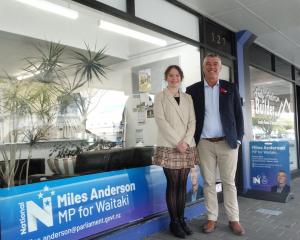North Otago Riding for the Disabled is on the lookout for more help as it seeks to maintain a vital service in support of people living with special needs or disability.

With about 17 volunteers the backbone of the organisation in Oamaru, it relies on the generous help and donations of volunteer time and community support.
Just recently, North Otago RDA had a visit from the residents of Northanger House who, through their own baking and preserving efforts, were able to donate over $2500.
RDA is a not-for-profit group with the core purpose of improving confidence, independence and wellbeing for people experiencing physical, intellectual, emotional and mental health challenges by offering riding and horse-related activities.
North Otago RDA chairwoman Deborah Lord said the group operated through donations, fees for adult riders, and annual grant-funding applications.
The need for what they provided was steady, she said.
"It’s very well used."
Those who came to RDA were individually supported by volunteers through a tailored programme.
Many of those who accessed RDA were formally referred through health and community agencies.
Individuals were assessed for a range of needs that RDA could assist to add to "quality of life", both physically and emotionally.
Ms Lord said the concept was based on the benefits of direct contact with horses.
RDA volunteer Els Jordens said the experiences of people with disabilities working with a large animal like a horse was proven to help build communication and confidence.
"It’s to help children and adults experiencing disability or with specific challenges or needs, to give them experience with horses and riding."
North Otago RDA has about 17 volunteers, "but more are needed", volunteer Sylvia Grasmueck said.
The Hayle St centre was effectively a seven-day-a-week operation, with six treasured horses and ponies kept on abut four hectares.
"Somebody has got to look after the horses."
On that front, anyone with an interest, including those wanting to learn about horse care or wishing to volunteer their assistance for those riding at the centre, were welcome.
People with administration, farming and mechanical skills were particularly welcome, given the scale of the operation.
"They need to be trained. Ideally, they do like horses and people . . . Last year we had over 33 people helping."
The centre operates riding sessions on Tuesdays and Thursdays during term time, plus regular training days for volunteers.










